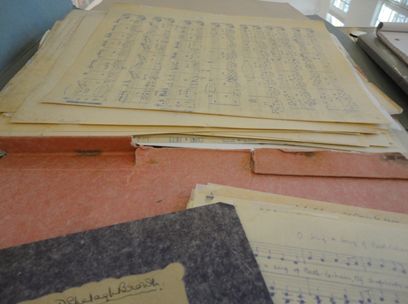When she looked back at the music she helped to create in the camps, former internee Norah Chambers, who came up with the idea of a vocal orchestra, commented: ‘I cannot imagine how we did it all in two short years.’ The vocal orchestra music she arranged in collaboration with Margaret Dryburgh, which was arguably the most significant part of their impressively high output, consisted of the following works:
Composer Work
Bach (Arr. Myra Hess) Jesu, Joy of Man’s Desiring
Barrett Coronach (A Highland Lament)
Beethoven Minuet in G
Beethoven First Movement (from Moonlight Sonata)
Boughton Fairy Song (from The Immortal Hour)
Brahms Waltz No. 15
Chaminade Aubade
Chopin Prelude No. 20 (‘Chord’ or ‘Funeral March’ Prelude)
Chopin Prelude No. 6
Chopin Prelude No.15 (‘Raindrop’ Prelude)
Debussy Rêverie
Dvo?ák Humoreske
Dvo?ák Largo (from ‘New World’ Symphony)
German Shepherd’s Dance (from Henry VIII Suite)
Godard Berceuse (from Jocelyn)
Grainger Handkerchief Dance (from Country Gardens)
Grieg Morning (from Peer Gynt Suite)
Handel Pastoral Symphony (from Messiah)
MacDowell Sea Song
MacDowell To A Wild Rose
Mendelssohn Song Without Words
Mendelssohn Venetian Gondola Song No.3
Mozart Allegro (from Sonata in C)
Paderewski Menuet à l’Antique
Ravel Bolero
Schubert First Movement (from Unfinished Symphony)
Schumann Träumerei (from Scenes From Childhood)
Traditional Auld Lang Syne
Traditional Londonderry Air
Tschaikovsky Andante Cantabile (from String Quartet No.1 in D)
and a Christmas Medley (Pastoral Symphony from Messiah; Good King Wenceslas; The First Nowell; Away in a Manger; Good Christian Men Rejoice; Cowley Carol; Sleep, Holy Babe; Hark, the Herald Angels Sing).

Some of the original Palembang Women’s Vocal Orchestra scores belonging to Shelagh Brown (Imperial War Museum)
The vocal orchestra music was published in 1987 by Universal Songs B.V., Holland and is still available to purchase in the United Kingdom under the title ‘Song of Survival’ from: United Music Publishers (Choral Catalogue, page 3). There are 6 volumes as follows: 1) Dvo?ák ‘s Largo, Captives’ Hymn, Jesu Joy of Man’s Desiring. 2) Christmas Medley. 3) Chopin’s Prelude No 20, Beethoven’s Minuet in G, Bolero, Londonderry Air. 4) To a Wild Rose, Auld Lang Syne, Country Gardens, Fairy Song. 5) Mozart’s Allegro, Tchaikovsky’s Andante Cantabile. 6) Morning from Peer Gynt, Chopin’s ‘Raindrop’ Prelude.
An SATB/Keyboard version is also available: Song of Survival, The Captives’ Hymn arranged for SATB a cappella. 312-41787 Theodore Presser Company http://www.presser.com
N.B.1. The vocal orchestra music is for SSAA (Soprano 1 & 2 and Alto 1 & 2).
N.B. 2. See the ‘Music’ PDF on the Educational Resources page for ideas about using the vocal orchestra music in schools.
Advice to Choir Leaders
Choir leaders interested in performing the vocal orchestra music are advised to start with Volumes 3 and 4 above. Norah Chambers herself gave the following advice to choir leaders/conductors in 1986:
‘…I think that any conductor who uses this music should use his or her own ideas as to sounds. I can only give the general idea of how we sang; so much was spoken to the singers by me beforehand, so that they would know what I wanted (such as dynamics – ‘”forte,” “piano,” etc.). Only about six of our thirty women could read music, so a certain amount of teaching and explaining had to be done, and some learned note by note and line by line, which to me was a tremendous achievement by all. I was lucky to find six trained voices from high sopranos to deep altos.’
